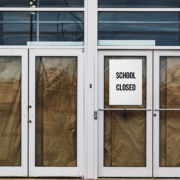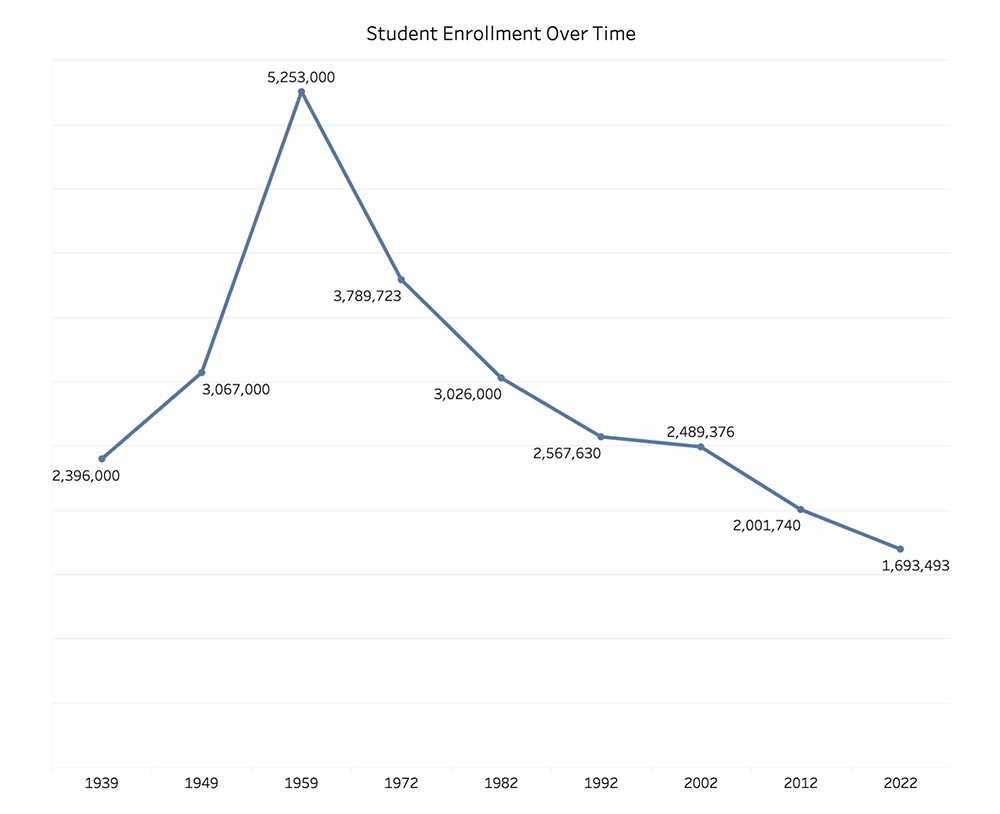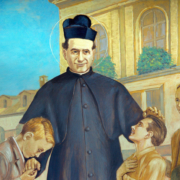Almost half of U.S. Catholics want the Church to recognize same-sex unions, according to the Pew Research Center. A majority support administering the Eucharist to cohabiting couples and divorced/remarried Catholics without an annulment.
These views differ sharply with the Church’s clear teaching on marriage, and we see similar confusion and disagreement among Catholics and in society at large over moral behaviors concerning gender, abortion, dress, language and more. It is not only a matter of disagreement with Catholic doctrine, but actual immoral practices and disintegration of the family.
For Catholic schools, this makes the admissions process all the more difficult. Some families today who seek enrollment in Catholic schools are deeply wounded or confused about marriage, parenting and human sexuality as God intends. Are they a good fit for Catholic schools?
Seeking God’s plan
Most of today’s parents grew up in a post-“sexual revolution” world, where the media have relentlessly promoted values and behaviors at odds with Catholic teaching. Even many Catholic parents are either unaware of a Catholic understanding in these areas or have dismissed or rejected them. Students are also suffering with deep confusion, with media messages telling them there are numerous gender identities and that feelings can trump their biology.
In all cases, Catholic schools must handle each case in a sensitive and charitable manner while maintaining faithfulness to Church teaching. In working with nontraditional or wounded families, educators should listen and seek to understand their complexities and limitations. Schools should not underestimate the time, compassion and resources this worthwhile outreach will require or assume that the school is the best or only vehicle for evangelization in such cases.
Keep in mind that nontraditional families are not burdens, but beloved children of a God who loves them intimately and has a plan of growth, healing or conversion for them. During the admissions process, Catholic schools can facilitate the conversation around that divine plan. It may include delaying or denying enrollment if certain behaviors pose a threat to the school’s religious mission or cause confusion and scandal. The expectation and right of enrolled students to receive formation that leads them to God—and not away from Him—takes priority over admitting a problematic new student.
Not every school has the capacity to sufficiently address the needs of children or their family members who desire enrollment in the school. Some families must be turned toward other alternatives for education, either because their views of life’s ultimate purpose and end are at odds with those of the Church, or because their example would lead others to sin. Such families might benefit from other forms of Catholic education, including homeschooling and parish catechetical instruction, that avoid some of the demands of a formal school community.
For instance, an atheistic family who vocalizes faith that a theistic God is a sham, or a family heavily into the occult or New Age religion. Admitting others who actively and publicly engage in cohabitation, polygamy, incest, or homosexual activity might be seen as condoning this type of behavior. The school must see that its religious mission of moral formation and evangelization is not publicly compromised, hindered or undone by significantly off-mission families.
Admitting such families might create mixed messages for the admitted student and others who are unable to rectify this cognitive dissonance. At some point, the school will teach a message opposite what the students are experiencing: that true Christian marriage is between one man and one woman, that God does in fact exist, that there are only two biological sexes, and so on. This will inevitably cause older children to question the actions of their adult family members or their teacher, pitting one against the other and creating skepticism of the teachings of the faith or distrust to authority in the minds and hearts of the students.
Many cases of nontraditional families (families other than a married couple of one man and one woman validly married in the Church) can be corrected through catechesis in the faith, such as for those who have a nascent understanding of Church teaching or those who come from a non-Catholic Christian background or other faith-based tradition. Cohabitating couples or parents who are divorced and remarried outside the Church have ways of correcting and regularizing their relationships.
Those Catholic families who struggle significantly with the acceptance of elements of Catholic faith or morals need the help of their parish priest or staff to discuss areas of conflict or uncertainty and to seek reconciliation with the Church. The integrity of such pastoral intervention is absolutely dependent on pastors and counselors being faithful to Catholic teaching and working closely in harmony with the Catholic school administrators and teachers as a cohesive team.
Examples of nontraditional families
Today there is a growing variety of family situations that pose difficulties for Catholic school admissions teams. Some are described briefly below, but I provide a deeper and more nuanced reflection in my paper, “Working with Nontraditional Families in Catholic Schools.”
Family from another faith: Catholic schools will normally welcome non-Catholic families of goodwill who are expressly and affirmatively supportive of the school’s primary Catholic religious mission, with the exception of Satanic, wiccan, occult or other blasphemous behaviors or practices which are serious conflicts with a Catholic school’s mission. Open hostility, public defiance and public challenges against Catholic truths or morality are signs that a family is not a good fit for a school’s primary evangelical mission. Non-Catholic students deserve the same religious instruction as Catholics and attend the same religious services and activities, participating to the extent they are able. Formal or ritual non-Catholic prayer services or activities are inappropriate and may be blasphemous.
Single-parent household: A single-parent household is not normally a barrier to enrolling in a Catholic school. The parent—like all parents—agrees to work in harmony with the school as it teaches the Catholic faith concerning marriage, chastity and divorce and to avoid behaviors which are contrary to Catholic teaching such as sexual promiscuity or adultery.
Cohabiting couple forming a household: A school should refer such couples to the local pastor for counseling and catechesis, in the hope of starting down a path of regularization. A couple may avoid scandal by living in chastity appropriate to their state in life. But if a pastor is aware that a catechized couple refuses to strive for a life of chastity, and in his judgment the couple is unlikely to consider such a move with additional outreach and catechesis, he may need to instruct them against enrolling their student. This is especially necessary if issues of public scandal arise.
Parents divorced and remarried outside the Church: The Church considers a valid marriage to be a permanent union between a man and a woman. Those who have divorced and remarried outside the Church and are reasonably assumed to be sexually active are involved in living an immoral lifestyle. A school may ask the couple to meet with the local parish priest to determine their status and if and how that status might be regularized in the Church, while doing all they can to avoid scandalizing students. If a couple refuses to attempt regularization or is unwilling to strive to meet Church requirements given their marital status, it may be prudent to deny admission.
Same-sex union: This circumstance is not identical to that of other parents in irregular or immoral family situations, which often can be regularized and may be publicly ambiguous. Same-sex couples who advocate and persist in their union actively and publicly model a different morality, present a lived counter-evangelization, and have a different understanding of what Christian integration of the mind, body and spirit looks like. Admitting students from families formed around same-sex unions, therefore, is a certain cause of scandal in Catholic schools and invites moral confusion. The couple is openly engaged in and openly promotes public, unrepentant, objectively disordered behavior, and the school itself can become complicit in confusion and scandal if it generates the appearance of normalcy, since the couple cannot possibly be on a path of regularization.
Student presenting with same-sex attraction: All students are called to chastity, which is the successful integration of sexuality within the person according to their state in life. A Catholic school’s mission is compromised if students are allowed to advocate or celebrate same-sex attraction as a personal positive good in the context of classes, activities or events. The school should not permit identification with such terms as “gay,” “lesbian,” “bisexual,” or “queer.” During the admissions process, a faithful Catholic school will present students who disclose same-sex attraction the beautiful and liberating teachings of the Catholic Church on God’s design for the human person and human sexuality. These students should, as a condition of enrollment, work with appropriate Church and diocesan offices, ministries and counselors in the hope of living in harmony with Christ’s teachings.
Parent identifying contrary to biological sex: The Catholic school can present such parents with the Church’s teaching about the human person and God’s plan for mankind and agree to this teaching for their children. In particular cases, parents may be directed to the local pastor and other faith-based psychologists and medical personnel, who can work with them to address their gender dysphoria. As a condition of a student’s enrollment, the parent whose sense of sexual identity is compromised agrees not to draw attention to his or her gender incongruence, so as not to confuse or scandalize the students.
Student identifying contrary to biological sex: A faithful Catholic school will inform the student and the student’s parents that the school interacts with all students according to their biological sex, not professed “gender identities.” The family should be willing to work toward integrating the student’s sexual identity with their biological sex, including counseling with their pastor and other trained Catholic medical and psychological professionals who are best able to help them in clarifying and defining issues of self (and sexual) identity in accord with Catholic teaching and God’s natural plan. If the student or parents insist on a name, clothing or behavior that publicly signal gender dysphoria, the student may not be a good fit for the school.
Student conceived by in-vitro fertilization or surrogacy: Children are always a gift from God, no matter the circumstances of their conception. But a parent’s or student’s public and persistent advocacy for these artificial methods of generating life, which undermines the teaching of the Church and the formative efforts of the school, is cause for denying admission.
Seeking true good for families
The challenges facing Catholic schools and the often-wounded families they are called to serve are significant and can almost seem overwhelming. This is a time calling not just for compassion, but also for courage. Courage to fulfill this ministry is required in a culture which may brand such teaching as judgmental or intolerant.
Instead, a faithful Catholic school demonstrates true compassion for nontraditional families. This may involve enrolling a family in a Catholic school, or it may require revoking, denying or delaying enrollment as a family undergoes faith formation and regularization through other Church ministries. In either case, the desire is to meet them where they are and eventually bring them home to full communion with Christ and His Church.






